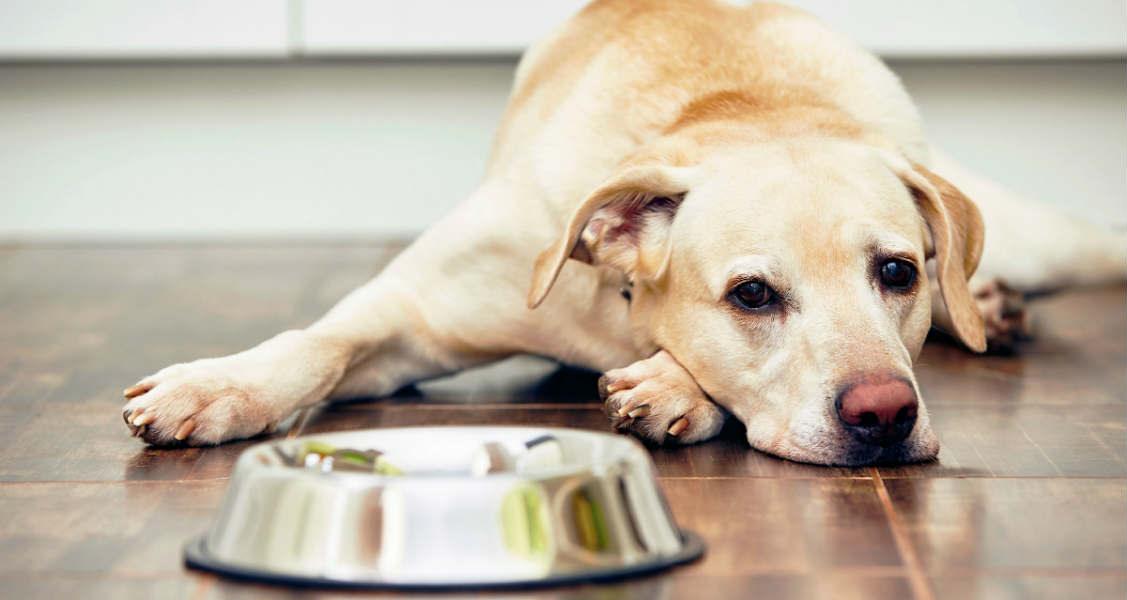3 Common Reasons Why a Dog Won’t Eat
By: Dr. Clayton Greenway, B.Sc., DVM | Feb 4, 2020

It can be extremely concerning and downright frustrating when a pet stops eating. If your dog is at a healthy weight then this is likely caused by a behavioral issue, however, if they are losing weight skip to point 3 as there may be an underlying medical condition involved. Here are 3 common reasons why a dog won’t eat.
1. Babying
The first and most common reason is because of the owners and let’s face it, many dogs tend to get babied. It’s common for people to carry them, let them sleep in their bed, baby talk to them, and let them get away with whatever they want. Dogs that didn’t receive a healthy amount of discipline when they were young tend to, for lack of a better term, be stubborn and demanding. Once the dog becomes undisciplined, they start to call the shots and think they’re in charge. They will turn their nose up at food especially if things have been added to it before. The process of adding things to the food means that you’re paying particular attention to the food and the dog will get used to this special attention. Without it, the food is less enticing. A dog can, in a sense, become like a spoiled child waiting for that extra special attention to occur associated with the food bowl before they are satisfied enough to eat. When human food is added to it, it’s very difficult to reverse that situation because they tend to start to expect it. Most owners don’t agree with me on this point and they often tell me that I just don’t understand their particular dog.
Consider putting the food out morning and night for 15 minutes each time and then picking it up. Don’t add anything extra to it and don’t play into this demanding nature where you put extra attention on the food. This is often pretty hard for owners to do because they have a really hard time seeing their dog not eat. In most of these cases the owners have actually inadvertently created the behavior by reinforcing it and giving so much attention to the pet food for adding lots of tasty things to it. Many dogs that are picky eaters have learned to wait until they see that happen before we leave.
2. Overfeeding
The other reason why this happens as it relates to the owners, is that as stated previously, pet parents in general really hate not seeing their dog eat. They will start to negotiate to try to get them to eat. It’s important to realize that if your dog is a healthy weight, you don’t need to push food on it. Dry food, in particular, is very rich in calories. When we look at the amount of dry food our dog eats, we naturally think it’s a small amount when in reality, it actually isn’t. If you tried to eat a small bowl of kibble you would realize very quickly that you become full. So in almost every case like this, the dog is at a healthy weight and the owner just wants it to eat more, when in actual fact, it’s eating the right amount.
3. Medical
Everything I’ve said so far addresses the common reason for dogs not eating. However, if the dog is not an ideal weight, and is actually underweight, then it’s a completely different situation and a lot more serious. If this were the case, I would want you to go to your veterinarian and have a physical exam performed and routine blood work to start. There could be a reason for the inappetence such as a metabolic disease, stomach irritation, pain, a lesion in the mouth, or dental disease. These would be medical reasons why your dog is not eating and they would lead to weight loss.
It’s important to consider medical reasons first and then look at behavioral. By employing these strategies you should have a more cooperative dog when it comes down to eating their food.


Disclaimer: healthcareforpets.com and its team of veterinarians and clinicians do not endorse any products, services, or recommended advice. All advice presented by our veterinarians, clinicians, tools, resources, etc is not meant to replace a regular physical exam and consultation with your primary veterinarian or other clinicians. We always encourage you to seek medical advice from your regular veterinarian.

